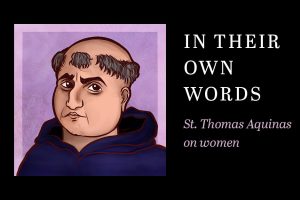Once I filled out the online survey, the flood began: Apparently I had not been discerning enough in my responses to the survey questions, because I think every religious order ever founded sent me an email or a note in the mail. It was quite overwhelming. There’s still a bag in the back of a closet in my parents’ house filled with vocations promotional materials that I really should recycle. How then did I ever decide to join the Carmelites?
It was one simple question, really: “What are you looking for?” That’s the question a Carmelite friar asked when he invited me to sit and chat about my nascent vocation. The question took me aback. Every other priest I had spoken to put things differently: “Here’s why you should join us.” Understandably enough—each was doing his job as a vocations promoter. But Father Don wasn’t there to promote the Carmelites. He was there to listen. And listen he did, without saying a word, for over an hour as I explained what I was looking for. I wanted community. I wanted prayer. I wanted an academic life. I wanted to do ministry.
Father Don suggested the mendicant orders: the Franciscans, the Augustinians, the Dominicans, the Servites, and, indeed, the Carmelites. A few months later, I visited him and his community in Washington, D.C., where I found myself home. I hadn’t actually been looking at the Carmelites. If they sent me a letter in the mail, it’s still somewhere in the back of that closet. But through that graced encounter with Father Don, the Carmelites came home, unexpectedly, to me.
I wish I could distill my discernment experience into a neat flowchart for you: “Are you interested in X? Then this order is for you. Y? Then go to Z.” At times, I have strongly desired such a process, an algorithm that would take the anxiety and uncertainty out of discernment by giving me some greater measure of control over the process. But that’s not how this works, I think. “Vocation” comes from the Latin vocare, to call—and we don’t control the calling. We are called. A genuine vocation flows from the Spirit, who will not be contained in a chart. “The wind blows where it chooses” (John 3:8): If we wish our vocation to be born of the Spirit, then we must let the Spirit bear us. We must let the Spirit call us in order to be called.
We can ready our hearts to receive the call through prayerful conversation with others and with God. Conversation guided me—genuine conversation, in which there was a give and take, as, for example, between me and Father Don. He questioned, I answered, and Carmel came. If I were able to have a similar conversation with those reading this essay, I might ask the following:
Who is calling you?
Where has God’s providence led you to this point? Who has God already placed in your life to call you to faith and vocation? In our digital age, we can easily deceive ourselves into thinking that we can find the perfect match if only we search hard enough and far enough. But you’ll never exhaust every possible option, because God has blessed the church with an overabundance of the Spirit. The charisms overflow. And more to the point, providence works. Simon, Andrew, James, and John tend their nets by the Sea of Galilee until Jesus comes calling (Mark 1:16–20). He calls them: a concrete person at a particular moment in their lives in their immediate neighborhood. They do not have to go check out the Essenes’ website to weigh the pros and cons of Jesus’ call: They just go.
Who has God put at your shore? Who concretely, not in the abstract? Many a Carmelite has told me he joined the order simply because the Carmelites were near to hand, or because another Carmelite invited him to join. You could call it convenience. You could call it coincidence. You could call it the Spirit, who calls us through the incarnate—through flesh and blood, through the particular, the historical, the contingent, and the concrete.
What moves you now?
The movement of the heart surges to the Spirit’s call, even before we know of it. “Were not our hearts burning within us?” the disciples ask themselves after they meet Jesus on the road to Emmaus (Luke 24:32). And then they set out for Jerusalem, following the Spirit and their hearts’ desire. What sets your heart afire? Service to the poor? Teaching in a classroom? The silence of a monastery?
These are questions of charism. The word means something like “spiritual gift,” and it can be used to describe either an individual person or a religious order. It functions sometimes as a synonym for talent, but the root of the word, charis, means something more like delight. In the Greek version of the Bible, for example, Noah finds charis before God (Gen. 6:8): God delights in Noah. Similarly, you may find delight in some religious order, even if it has, on paper, a less well-defined charism. (If you ask 10 members of my province what the Carmelite charism is, you will get 10 different answers. I love that!) This question of charism has less to do with your native talent and more to do with simple delight. In the movie Chariots of Fire, the Olympian Eric Liddell puts it this way: “When I run, I feel [God’s] pleasure.” Put yourself in Noah’s shoes (or sandals): How do you feel God’s pleasure in you?
When you think of your life’s end, what will you want to see, looking back?
I’m borrowing that question from a retreat director, Father Dave. When I told Father Dave I had doubts about making final vows, he gave me that question to consider from a Jesuit guide to the “discernment of spirits.” The question sobers me, as Ash Wednesday does. It reminds me that life here on Earth has its limits and that the choices we make do matter because they change life’s direction. We have finite resources and only so much time to use them. Eventually, we do have to decide: Will I choose X? Or Y? Would I choose the Carmelites? Or not? The question Father Dave asked reminded me of the urgency of my decision.
Yet if this question reminded me of my finitude, it also reminded me of eternity. It invited me to perch, for a brief, lasting moment, on the threshold of eternity. And standing for that moment, before the Lord of Glory, I could say, with complete certainty, “Pray God, tell me that I became a Carmelite!” What can I tell you of the strange, paradoxical effect that the juxtaposition of my finitude with eternity had on me? Only this: I knew, in that moment, my finitude as gift rather than limitation—a gift flowing from God, weighting my decision with lasting significance.
To me, this gift is wrapped in the sure certainty of God’s love. Because here’s the thing: You can make a mistake. It’s OK. Yes, you may join an order that doesn’t suit you. You may find out that teaching, for instance, doesn’t delight you after all. Not one bit. You may even find that God seems to be tugging you right out of religious life altogether. But consider what that means: God is still present to you, precisely through that call to change course. So do not be afraid. If you make a poor decision, God will go right along with you. God will never abandon you. And if God is for you, who can be against you (Rom. 8:31)? You have one unlimited resource, grace, and that grace is so strong it can make even a mistake beautiful. Lord, how many times have I prayed that I might at least make a beautiful mistake!
What I have learned from my discernment to the Carmelites is that the Spirit is calling you, and the call is real. Don’t be afraid to answer the question: What are you looking for?
This article also appears in the June 2022 issue of U.S. Catholic (Vol. 87, No. 6, pages 19-20). Click here to subscribe to the magazine.
Image: iStock/John M. Chase















Add comment